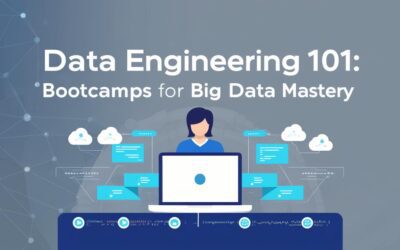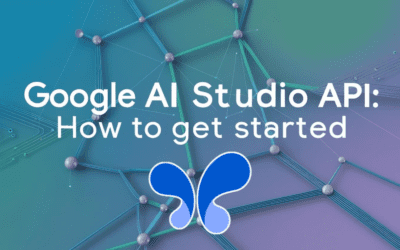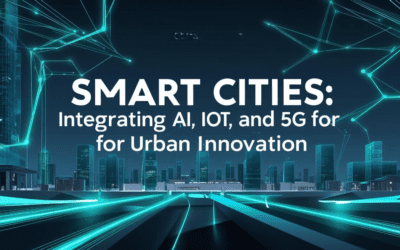As climate change accelerates, the demand for sustainable solutions has never been greater. The global green technology market is projected to reach $61.92 billion by 2030, growing at a 27.8% CAGR (Fortune Business Insights). At the heart of this revolution lies artificial intelligence (AI), a transformative force driving efficiency in renewable energy, circular economies, and climate resilience. This guide explores the essential skills and tools needed to excel in green tech careers, empowering you to bridge the gap between innovation and sustainability.
The Role of AI in Driving Sustainable Solutions
AI’s Impact Across Industries
AI is reshaping sustainability efforts by optimizing resource use, predicting environmental risks, and accelerating clean energy adoption. Key examples include:
- Renewable Energy Optimization
- Google’s DeepMind reduced energy consumption in data centers by 40% using AI-driven cooling systems.
- Startups like Clir use machine learning to boost wind turbine efficiency by 10-15%, generating 1.5 gigawatt-hours of additional clean energy annually.
- Smart Agriculture
- IBM’s Watson Decision Platform helps farmers cut water usage by 20% while increasing crop yields through predictive analytics.
- Waste Management
- AMP Robotics employs AI-powered systems to sort recyclables with 99% accuracy, diverting 10 billion+ waste units from landfills since 2020.
Stat: AI could reduce global greenhouse gas emissions by 4% by 2030—equivalent to eliminating the combined emissions of Australia, Canada, and Japan (BCG).
Essential Skills for Green Tech Careers
Technical Competencies
- AI and Machine Learning
- Master tools like TensorFlow and PyTorch to develop predictive models for energy forecasting or carbon tracking.
- Example: Tesla’s Autobidder uses ML to optimize battery storage in real-time energy markets.
- Data Analysis and IoT Integration
- Analyze sensor data from smart grids or IoT-enabled devices to enhance sustainability metrics.
- Life Cycle Assessment (LCA)
- Use software like SimaPro to evaluate the environmental impact of products from cradle to grave.
Soft Skills
- Systems Thinking: Understand interconnected sustainability challenges (e.g., balancing energy demand with grid stability).
- Interdisciplinary Collaboration: Work with policymakers, engineers, and ecologists to design holistic solutions.
Tools and Technologies Shaping the Industry
| Tool | Application | Example |
|---|---|---|
| Python/R | Building climate models | ClimateLab (open-source simulations) |
| ArcGIS | Mapping renewable energy sites | Solar farm site optimization |
| AutoDesk CFD | Simulating airflow in wind turbines | Turbine blade design efficiency |
| IBM PAIRS | Geospatial analysis for agriculture | Drought risk prediction |
Pathways to Entering Green Tech Careers
1. Education and Certifications
- Pursue degrees in environmental science, data analytics, or sustainable engineering.
- Certifications:
- Google’s AI for Sustainability (Coursera)
- LEED Green Associate (USGBC)
2. Hands-On Experience
- Join open-source projects like Open Climate Fix, which uses AI to forecast solar energy output.
- Intern with green tech firms (e.g., Ørsted, Beyond Meat) to gain industry insights.
3. Networking
- Engage with communities like GreenBiz 350 or attend conferences like COP28 to connect with thought leaders.
Future Trends and Opportunities
- AI-Powered Carbon Capture
- Startups like CarbonCure use AI to optimize concrete production, permanently storing CO2 in building materials.
- Climate Risk Analytics
- Tools like Jupiter Intelligence predict flood and wildfire risks, aiding insurers and governments in resilience planning.
- Circular Economy Platforms
- AI-driven marketplaces like Rheaply enable companies to repurpose unused materials, reducing industrial waste.
Stat: By 2025, 50% of enterprises will link sustainability metrics to executive pay (Gartner).
Conclusion: Lead the Charge Toward a Sustainable Future
Green tech careers offer a unique opportunity to merge technical expertise with planetary stewardship. By mastering AI tools, fostering interdisciplinary collaboration, and staying ahead of trends, you can position yourself at the forefront of this transformative field.
Your Action Plan:
- Upskill: Enroll in AI or sustainability courses today.
- Specialize: Focus on high-impact areas like renewable energy or carbon accounting.
- Advocate: Promote green tech solutions within your organization or community.
The future is green—and with the right skills, it’s yours to shape.
Sources:
- Fortune Business Insights, Green Tech Market Report
- BCG, AI’s Role in Emissions Reduction
- Google DeepMind Case Study
- Gartner Sustainability Trends
Stay ahead with The ProTec Blog—your guide to innovation in sustainability and technology.


















